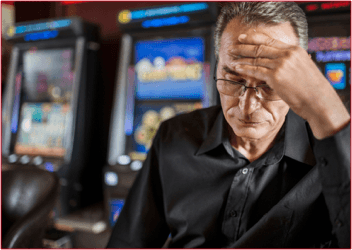- Home
- Responsible Gambling

Problem gambling is the extreme end of a sliding scale that the Canadian Problem Gambling Index categorizes as follows:
Problem gambling occurs when an individual has lost control of their gambling. They exhibit behaviours that are detrimental to their health and well being, and their problems may extend to affect the well being of friends and family. The affected person will routinely bet more than they can afford, and will display negative behaviour traits such as increased recklessness, lying to friends and family and becoming aggressive when confronted about their gambling activities. Problem gambling has been recently reassigned as an addiction in the DSM (The Diagnostic and Statistical Manual of Mental Disorders). This has led to a greater understanding of the problem and the way it can be treated. Affected individuals suffer a complex problem that needs to be treated with care and professional help.
Being on a winning streak does not mean that a person should bet more than they can afford. The tables can turn harshly and without warning, and a gambler should always remain in control of their spending. When this gets out of hand, it is likely that the gambler has fallen into the trap of addiction. Often problem gamblers do not know when to walk away from the table, and will keep betting, compulsively, and without regard to their increasing debt.

A problem gambler will often be incredibly secretive about their addiction. They will attempt to maintain the semblance of normalcy, even while their life is spiraling out of control. They do this to protect their addiction, as it has over taken their brain to become the most important thing in their lives. This happens because of a problem with the reward center in the brain. Gambling stimulates the reward center in the brain to produce a pleasurable feeling. Dopamine and serotonin are released, producing a similar experience to certain drugs. This is where the addiction comes into play. When these reward centers are over stimulated, the brain can become dependent on the sensation and feels a sense of loss when they are not aroused. This causes the individual to disregard other aspects of their personal life, such as family and fiscal welfare, in order to placate the gambling addiction.
The symptoms that a problem gambler exhibits are similar to other addictions. These include but are not limited to:
While these are the warning signs to watch out for, they are only the symptoms and not the cause of the afflicted persons addiction. There are many reasons why someone can turn to gambling as a temporary solution to their problems. It is this root cause that professional therapy will help the victim to overcome.

If you or a member of your family is suffering from this disease then it is vital that you obtain professional help as soon as possible. The best place to start is at Gambling Anonymous, but a full list of resources will be available at the end of this article. Gamblers Anonymous, like it's more famous alcoholic counterpart, is a 12-step program that focuses on group support and therapy. Choosing a sponsor is a vital part of the healing process. A sponsor is another member of Gamblers Anonymous who the individual can turn to when temptation arises. Both ex-gamblers can encourage each other to remain strong with the added benefit of experience and understanding.
If a family member is affected, approach them kindly and helpfully, and try not to be drawn into an argument. Arguing with an addict is a futile effort, as the problem gambler will use negativity to fuel their desire for their fix. Remain calm and insist they seek professional help. Offer your support, not your judgment. Try to include them in normal, fun activities that they used to enjoy. This will help them in the rehabilitation process.
If you feel that your gambling has gotten out of control then reach out to a member of your family and seek professional help. Distract yourself when the urge arises by engaging in another enjoyable activity. Surround yourselves with friends and family, especially if you are feeling the need for isolation. People that love you will give you the reality check you need in order to take the next step in your recovery process.
Canadian Centre on Substance Abuse
This website offers a comprehensive resource of information about problem gambling and where to find help
on a national level.
www.ccsa.ca
Canadian Mental Health Association
You needn't suffer with your mental health issues alone. This website will direct you to mental health
support in your local area and will provide more information on coping with mental
illness.
www.cmha.ca
Ontario Problem Gambling Helpline
For immediate help dial this national helpline to speak with a fully trained member of staff who will
direct you to organisations near you to help with depression, debt counselling and
therapy.
www.problemgamblinghelpline.ca
Credit Canada
This is a not for profit organisation that teaches people how to safely escape from and deal with debt.
They provide immediate relief for pressing debt problems and enables people to rehabilitate without the
pressures of the bailiffs at the door.
creditcanada.com